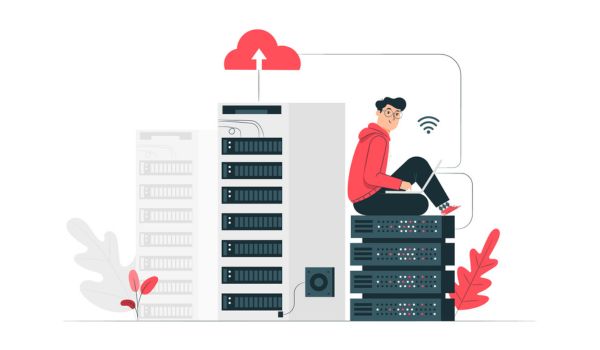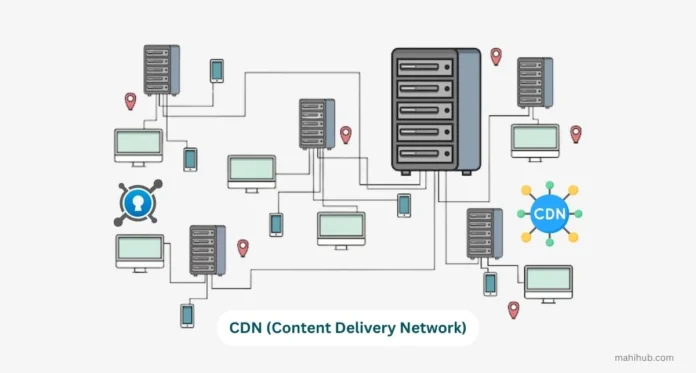Explore the Content Delivery Networks (CDNs) and their role in modern web infrastructure. Faster content delivery, improved website performance, and enhanced user experience.
Implement a CDN solution to boost your website’s speed and reliability today.
What is CDN?
In today’s fast-paced digital world, website speed and performance are crucial factors for success. This is where Content Delivery Networks (CDNs) come into play. But what is CDN, and why is it so important?
CDN stands for Content Delivery Network. It is a geographically distributed network of servers that work together to deliver web content quickly and efficiently to users across the globe.

When you ask, “What is CDN?” you’re essentially inquiring about a system designed to optimize the delivery of web content, including images, videos, stylesheets, and other static assets.
To understand what is CDN, imagine a network of servers spread across various locations worldwide. These servers store copies of your website’s content, ready to be delivered to users from the nearest possible location.
This content distribution is the core concept behind CDNs and makes them so effective in improving website performance.
Must Read^ What Is SEO – Why Is SEO Important?
Why is a CDN important?

Now that we’ve answered the question “What is CDN?” let’s explore why it’s crucial for modern websites:
- Faster content delivery: CDNs reduce the physical distance between the user and the server, resulting in quicker load times.
- Improved user experience: Faster-loading websites lead to higher user satisfaction and engagement.
- Reduced server load: By distributing content across multiple servers, CDNs alleviate the burden on origin servers.
- Enhanced website reliability: CDNs provide redundancy, ensuring your content remains accessible even if one server fails.
- Increased security: Many CDNs offer built-in security features to protect against DDoS attacks and other cyber threats.
Understanding what is CDN and its importance is crucial for anyone looking to optimize their web presence.
As websites become more complex and user expectations for speed continue to rise, CDNs play an increasingly vital role in delivering a seamless online experience.

How does a CDN work?
To fully grasp what is CDN, it’s essential to understand its underlying mechanics. Here’s a step-by-step explanation of how a CDN operates:
- Content caching: When a user first requests content from a website using a CDN, the CDN server nearest to the user retrieves the content from the origin server and caches a copy.
- Subsequent requests: For future requests, the CDN can serve the cached content directly, reducing the load on the origin server and decreasing latency.
- Load balancing: CDNs distribute incoming requests across multiple servers to prevent any single server from becoming overwhelmed.
- Intelligent routing: CDNs use sophisticated algorithms to determine the optimal path for content delivery, considering factors like server health, network conditions, and user location.
- Content optimization: Many CDNs automatically optimize content for different devices and connection speeds, further enhancing performance.
By understanding how a CDN works, you can better appreciate its role in improving web performance and user experience. This knowledge of what is CDN and its functioning is valuable for website owners and developers alike.
Must Read^ Boost Your Website Speed with the Best Plugin for Optimization
What is a CDN used for?
Now that we’ve covered what is CDN and how it works, let’s explore its various applications:
- Accelerating website loading times: This is the primary use of CDNs, especially for content-heavy websites.
- Reducing bandwidth costs: By caching content and serving it from edge servers, CDNs can significantly reduce the bandwidth consumption of origin servers.
- Improving availability and redundancy: CDNs provide a safety net against server failures and traffic spikes.
- Enhancing security: Many CDNs offer features like SSL/TLS encryption and protection against DDoS attacks.
- Global content delivery: CDNs make it easier to deliver content to a worldwide audience with consistent performance.
- Video streaming: CDNs are crucial for delivering high-quality video content with minimal buffering.
- Software distribution: Large files, such as software updates, can be efficiently distributed using CDNs.
Understanding what is CDN used for can help you determine whether implementing a CDN would benefit your specific use case.

What are the benefits of using a CDN?
The advantages of using a CDN are numerous and can significantly impact your website’s performance and user experience. Here are some key benefits that answer the question “What is CDN good for?”:
- Improved page load times: By serving content from servers closer to the end-user, CDNs dramatically reduce latency.
- Reduced bounce rates: Faster-loading pages keep users engaged, decreasing the likelihood of them leaving your site.
- Better SEO performance: Search engines favor faster websites, potentially improving your search rankings.
- Increased conversion rates: Quicker load times can lead to higher conversion rates for e-commerce sites.
- Cost savings: While there’s an upfront cost to implementing a CDN, it can lead to long-term savings in bandwidth and infrastructure costs.
- Scalability: CDNs can handle traffic spikes more efficiently than traditional hosting solutions.
- Global reach: CDNs make it easier to deliver content to users around the world with consistent performance.
- Analytics and insights: Many CDNs provide detailed analytics about your content delivery and user behavior.
These benefits highlight why understanding what is CDN and implementing one can be a game-changer for your online presence.
Conclusion
In conclusion, understanding what is CDN is crucial in today’s digital landscape. Content Delivery Networks play a vital role in enhancing website performance, user experience, and global content delivery.
By distributing content across a network of servers, CDNs significantly reduce latency, improve load times, and provide a host of other benefits.
Whether you’re running a small blog or managing a large e-commerce platform, implementing a CDN can lead to tangible improvements in your website’s performance and user satisfaction.
As the internet continues to evolve and user expectations for speed and reliability grow, the importance of CDNs is only likely to increase.
Now that you have a comprehensive understanding of what is CDN, its workings, and its benefits, you’re better equipped to make informed decisions about your web infrastructure. Consider exploring CDN options for your website to stay competitive in the fast-paced digital world.
Frequently Asked Questions(FAQs)
What is a CDN used for?
A CDN is primarily used to accelerate content delivery and improve website performance. It achieves this by caching content on multiple servers worldwide, reducing the distance between users and the content they’re accessing.
CDNs are also used for reducing bandwidth costs, enhancing security, and improving the overall reliability of websites and web applications.
What is an example of using CDN?
A common example of using a CDN is for image delivery on a content-heavy website. Let’s say you have a news website with numerous images.
Without a CDN, all these images would be served from your origin server, potentially leading to slow load times for users far from your server. With a CDN, these images are cached on multiple servers worldwide.
When a user in, say, Tokyo accesses your US-based website, the images are served from a nearby server in Asia, resulting in much faster load times.
What is the concept of CDN?
The core concept of CDN revolves around distributed content delivery. Instead of serving all content from a single origin server, a CDN distributes copies of your content to multiple servers (called edge servers) worldwide.
When a user requests content, it’s delivered from the edge server nearest to them, reducing latency and improving load times. This distributed approach is the fundamental concept behind what CDN is and how it operates.
Is CDN good or bad?
CDN is generally considered good for most websites, especially those with a global audience or high traffic volumes. The benefits of using a CDN, such as improved load times, reduced server load, and enhanced reliability, often outweigh the costs for many websites.
However, for very small, locally-focused websites with limited traffic, the benefits might not justify the cost and complexity of implementing a CDN. It’s important to assess your specific needs when deciding whether a CDN is right for your website.
Want to master SEO? Read our step-by-step guide in this blog:
✅ What Is SEO – Why Is SEO Important?
✅ What is On-Page SEO? The Ultimate Guide 2024
✅ What Is Technical SEO? The Ultimate Guide
✅ Top 7 Best WordPress SEO Plugins for 2024
✅ 5 Best SEO Audit Tools for 2024
✅ What is an XML Sitemaps: The Ultimate Guide
✅ What is Keyword Research? The Best Guide in 2024


